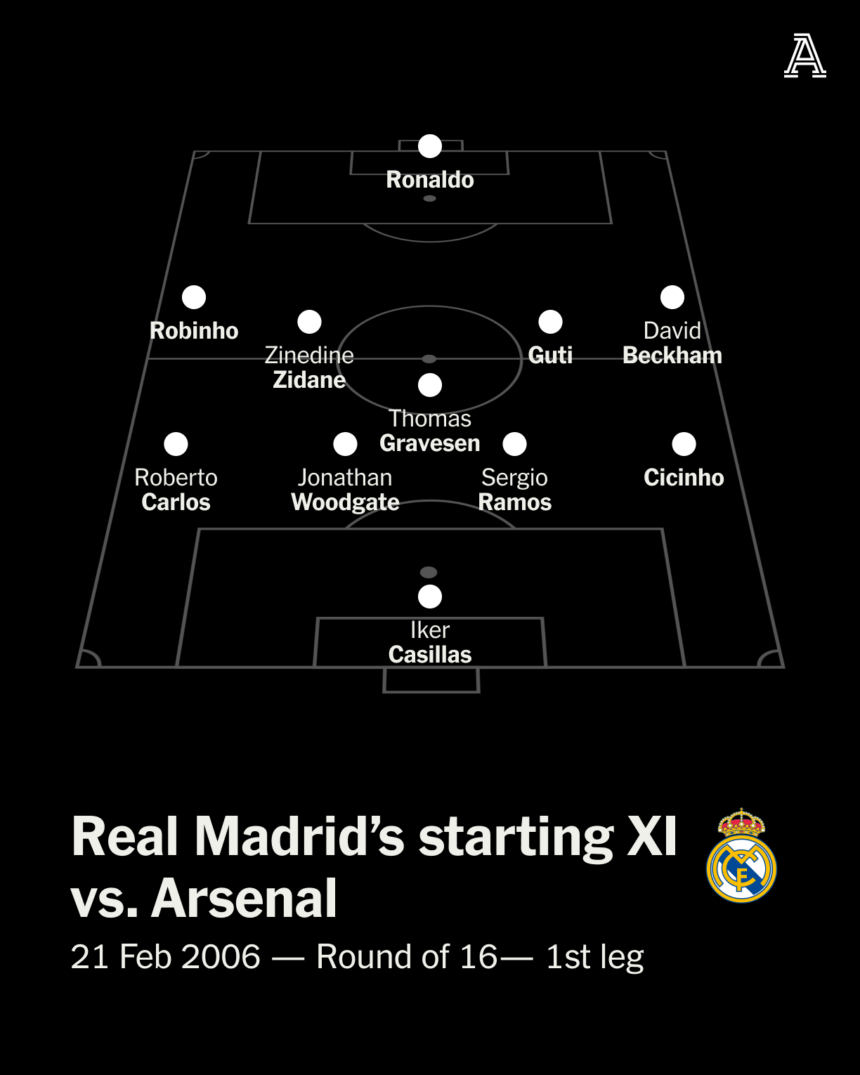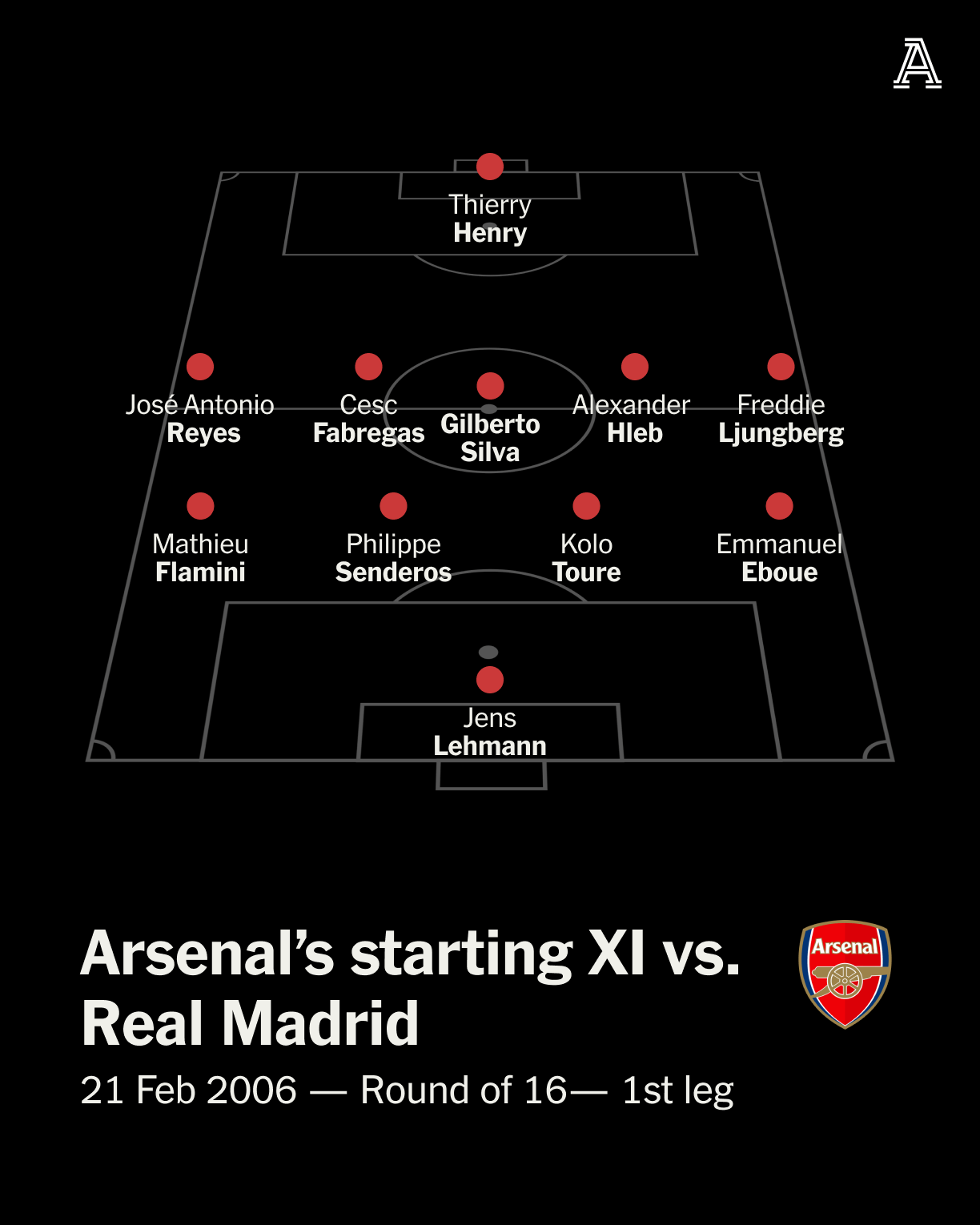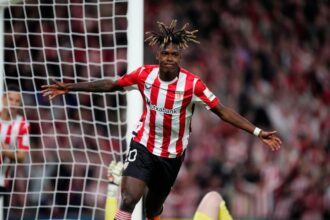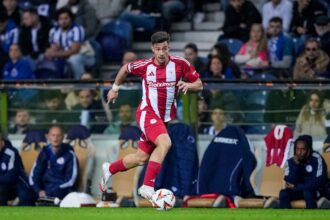Before Arsenal face Real Madrid in the Champions League quarter-final first leg at the Emirates, Amy Lawrence looks back at a famous tie between the two clubs in 2005-06, starting with a masterclass from Thierry Henry et al in the first leg at the Bernabeu followed by one of the greatest 0-0s back at Highbury…
Meandering outside the Bernabeu an hour or so before kick-off, there is no inkling whatsoever of the transcendental twist that is about to happen. The Madridistas rock up unperturbed. Arsenal’s band of travelling fans are, frankly, resigned. All logic points to an inevitable outcome. From a north London perspective, this feels like a summit where hope goes to die.
Advertisement
It is February 2006. Real Madrid’s galactico era is admittedly on the downward curve, past its most audacious peak. The glitziest are older now. But Madrid still possess players whose names alone carry the clout of heavyweight champions: the inestimable Zinedine Zidane, the Brazilian fenomeno Ronaldo, Roberto Carlos, David Beckham, Raul. They all still have reserves of brilliance to burn. Madrid also, strangely, have Jonathan Woodgate and Thomas Gravesen, which gives a hint of a galactico-lite recipe. But overall, the club still carry themselves grandly. The stadium is noisy and expectant.
Arsenal turn up damaged by a bruising season.
The month leading up to their Champions League tie with Real Madrid has been absolutely hideous. They contrived to lose in three different domestic competitions over a few days that Arsene Wenger lamentably called his “worst week”. They tumbled out the cups in humiliating fashion to the luminaries from Wigan Athletic and Bolton Wanderers. Seemingly out of nowhere Sol Campbell, one of their most experienced players and a bedrock of the defence, had an existential flash and walked straight off the pitch and out of the stadium at half-time of a home defeat against West Ham United.
The injury list was so absurd that season they used eight different players at left back, the most recent being Mathieu Flamini, a feisty central midfielder repurposed because there was no alternative. And now Campbell’s absence requires the emergency promotion of another youngster, Philippe Senderos.
Arsenal must tackle Madrid with one of the oddest defensive mixes they have ever called upon. At right-back, Emmanuel Eboue, raw and unpredictable in his breakthrough season, is fresh from his first Premier League start the game before Madrid. Senderos, Campbell’s replacement, is a thoughtful boy in the early stages of his Arsenal career. It is one week after his 21st birthday. Only Kolo Toure, at the grand old age of 24, is a member of the establishment who must hold it all together.
Through injury and unavailability, a back line that might have read Lauren-Campbell-Toure-Ashley Cole (mainstays of the Invincible season two years before), instead brings the Eboue-Toure-Senderos-Flamini spontaneous jazz collective to the team sheet. Madness.
Suffice it to say, Arsenal are not in tip-top shape to take on the might of a European football powerhouse away from home — just to add to the weight of the task, no English team had ever won at Real Madrid. Wenger and his coaching corner have little option but to big them up, chuck a bucket of cold water over them, and push them into the ring.
Advertisement
But…
They do have a few interesting things going for them. Wenger eschews his favoured formation to pack the midfield in a 4-5-1 and the quintet across the middle is full of quality, including the experience of Gilberto Silva and Freddie Ljungberg, and a teenager called Cesc Fabregas going back to his homeland ready to show what he is made of.
They also have a front man who might have been notably capricious during a difficult campaign, but is fundamentally capable of startling greatness. Thierry Henry, what do you have in store, with your red captain’s armband wrapped round your left bicep, and this off-form, wing-and-a-prayer team behind you? Thierry, are you in the mood to take so much adversity and turn it into fuel?
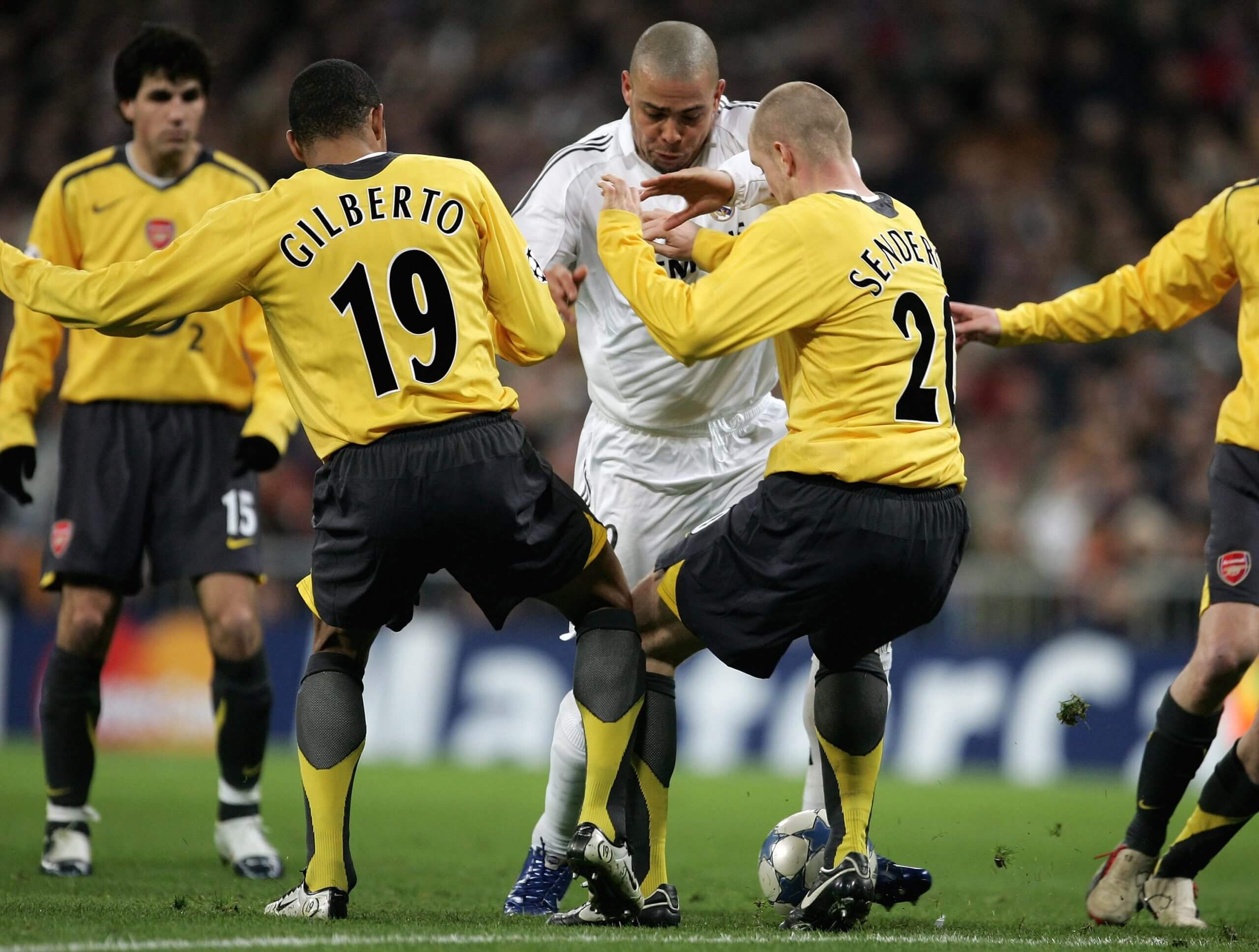
Ronaldo is challenged by Gilberto and Senderos (Richard Heathcote/Getty Images)
“Thierry Henry is of course a history of the club in himself.” So said Arsene Wenger.
By 2006, Henry had been the man you dare not take your eyes off at Arsenal for seven years. He was the supreme goalscorer and the showman. He won countless trophies and individual awards in the Premier League. He was an essential part of France winning the World Cup and European Championship double. In his pomp, he was robbed of a Ballon d’Or.
Henry was his club’s VIP. His status caught the global imagination — not just as a great footballer but as someone uncommonly eye-catching because his finely tuned skill set was so audacious in its delivery. He brought cool. He displayed splendour. He demanded attention. In that period, Arsenal attracted a much more globalised fanbase and he was central to that — in a way that has become even clearer with the passing years.

Henry with Wenger at Highbury in 2006 (Stuart MacFarlane/Arsenal FC via Getty Images)
Look at how Cecilio Waterman scored against the U.S. last month and zoomed to the side of the pitch to share in the moment of his footballing life with a player he worshipped as a boy in Panama. “You are my idol,” he yelled at Henry, who was there on CBS punditry duty, Waterman’s eyes wide at the enormity of this worlds colliding moment.
Advertisement
Real Madrid in 2006 was clearly not Henry’s first rodeo. But it turned out to be one of his most classically Henry-esque rides. The responsibility of leading his team from the front, of bringing the necessary arrogance to walk out at the Bernabeu — where Arsenal’s current side will venture next week after tonight’s Champions League quarter-final first leg — ready to elevate the show, lit an electrical charge in him.
Honestly, up to that point the 2005-06 season had been demoralising. Henry being Henry, he showed his emotions readily on the pitch. With some of his fellow big guns gone (Patrick Vieira) or less influential in their last season at Arsenal (Dennis Bergkamp and Robert Pires), he was finding it hard to adjust to a dip. He was also inhibited by an Achilles injury and not running smoothly. If he was dismayed by a team-mate or disappointed by a performance, the hands-on-hips thousand-yard stare was inescapable.
His Arsenal love affair hit a rocky patch. Meanwhile, Barcelona were not so much admiring from a distance as openly pushing their way to him for a dance.
Henry led his team out at the Bernabeu as if none of that mattered. They were geared up for a turning point. They were ready to liberate themselves and do something remarkable.
Arsenal went for the jugular. Henry was involved in three chances in the opening 10 minutes, setting up Jose Antonio Reyes and Ljungberg, before heading goalwards himself.
The moment of the tie came just after half-time. Henry picked up possession in the centre circle, switched into va-va-voom mode and went on a run that bypassed five opponents, his gaze glued to the ball as he ran on and on. He shrugged off Ronaldo, Guti ended up on the floor, Sergio Ramos could not catch him. A crack of the left foot and the ball angled under Iker Casillas’ dive and into the corner of the net. Henry ran and ran some more, arms outstretched to capture the significance of the goal.
The interesting thing was that Arsenal didn’t retreat after that. They continued to take the game to Madrid, who were restricted to a couple of chances that Jens Lehmann dealt with. From back to front, Arsenal’s players all performed at the top level.
Henry was the headline-maker, but it did not go unnoticed that Fabregas was afforded that rare compliment of being applauded off the pitch by the home fans. The makeshift back four kept composure. The midfield five worked with an effective blend of tenacity and ambition. As Wenger said, “There was not a single player who wasn’t outstanding.”
Galacticos schmalacticos. For the night, it was Henry’s playground. He had the strut. He oozed the swagger. He grabbed the limelight and didn’t let go.
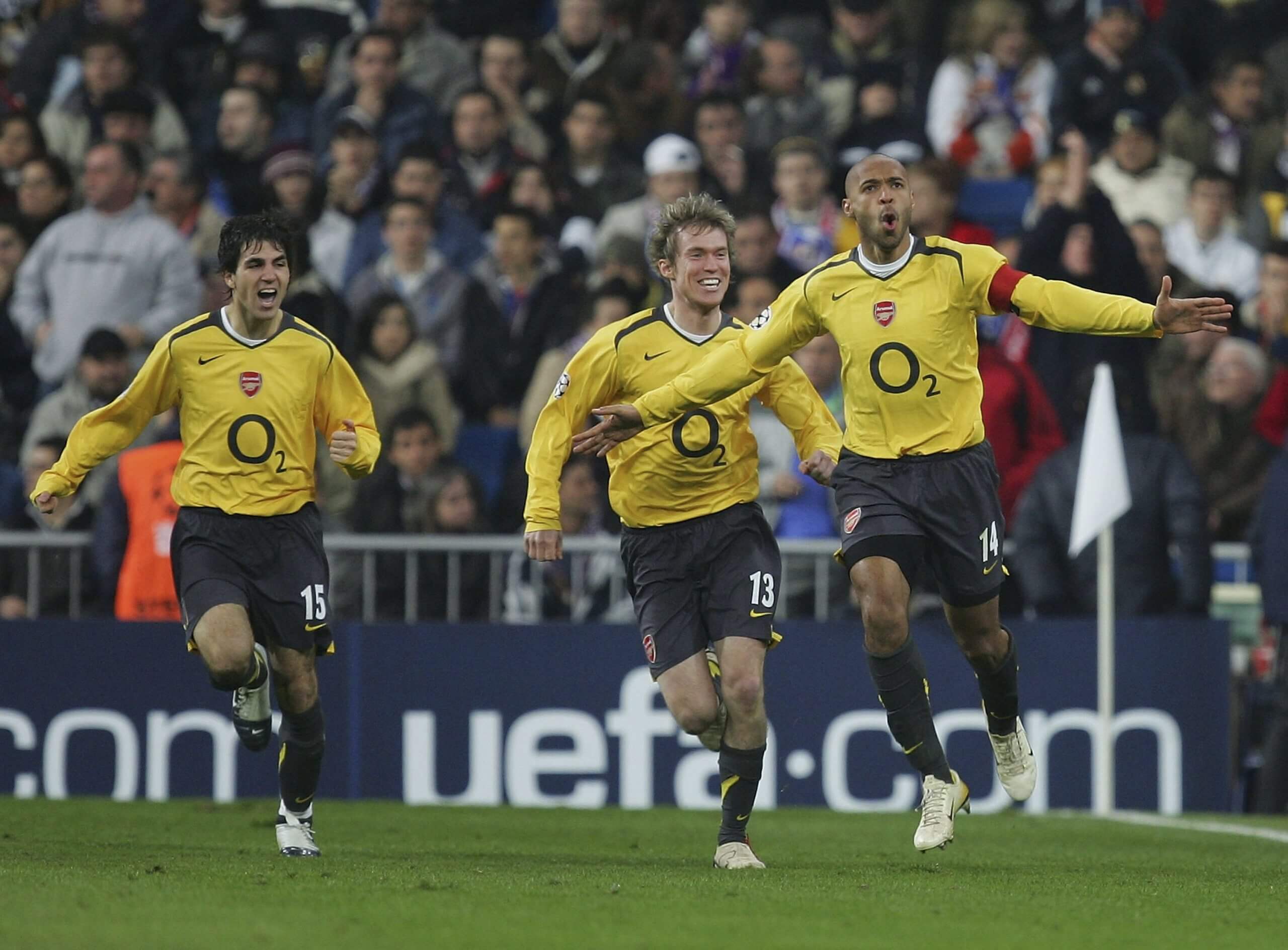
Henry after scoring at the Bernabeu (Denis Doyle/Getty Images)
Onto Highbury for the second leg. A number of Arsenal players noted the Bernabeu’s roomy surface was a key factor in their 1-0 win in Madrid. Back home they had to be as commanding on their famously narrow pitch.
“There’s a danger people think the hard work is done,” Wenger noted in his pre-match press conference. “But don’t imagine that Real Madrid rolls the red carpet out and says, ‘OK, we will let you go into the quarter-final’.”
Advertisement
What played out was one of the greatest, most captivating, nil-nil draws ever seen at dear old Highbury.
Two minutes in and Zidane looped a cross to Ronaldo — unmarked — but Lehmann was able to smother. It was the first of multiple chances at both ends as the two teams exchanged attacks. Reyes rattled the bar for Arsenal. Raul did the same for Madrid and then Lehmann followed up with a wonder save. The balanced tension was phenomenal, beautiful even.
The final whistle signalled bedlam. “There was a huge release of emotion at the end of the game,” Lehmann told UEFA.com post-match. “This result means so much to us, it will take a little while to sink in. The young players coped extremely well with the pressure and played two outstanding matches.”
Henry observed the all important thing that changed that team in those couple of games. “We played well because we played as a team again,” he said in his programme notes before the quarter-final against Juventus.
Together, in a short time, Arsenal travelled a long, long way from the pre-Bernabeu doom.
Postscript.
It was an emotionally loaded time. Arsenal were counting down to the end of Highbury. The very first seats were bolted down at the Emirates a matter of days after the Madrid game. With that Champions League tie, they created a memory that lasts — almost two decades now.
Arsenal were buoyed by it. They beat Juventus in the next round, then Villarreal in the semis, to qualify for the Champions League final. They also recovered their Premier League position sufficiently to finish in the top four, and celebrate their final ever match at Highbury with a St Totteringham’s Day special.
They lost the final against Barcelona. The whole experience was so intense, with the Champions League and the farewell to Highbury stirring up so much feeling, Henry chose to stay with Arsenal to lead them into the Emirates era. He rejected (for a season anyway) Barcelona’s intense overtures.
If Mikel Arteta thinks Arsenal have problems ahead of their quarter-final with Madrid, it may be some consolation to know that it isn’t the first time.
A chat with his old boss, Wenger, would fill him in on the details. It will be maddening for him to lose Gabriel, such a strong heartbeat in the defence, a problem exacerbated by the injuries that struck a couple of his natural replacements. It will also be frustrating to battle on with a makeshift striker, the converted midfielder Mikel Merino, to compensate for the wipeout of all the normal centre forward options.
Advertisement
In contests of this stature, it helps to have form and fitness on your side. But sometimes, football confounds all reasonable expectation. “Well, it’s an inspiration for sure,” Arteta said of the class of ’06 in his pre-match press conference.
He wants his generation to write their own story now. “That’s exactly what we need. To create that, you have to go through hurdles and we’ve been though one to reach the quarter-final for the first time in a long time and now we’ve done it twice in a row. Now we want much more and we are very capable of doing it. I have full belief that we can do it and the team, and everybody in the stadium, will feel the same way.
“Our mindset is going to be very, very important.”

Arteta wants Arsenal to create their own history against Madrid (Richard Heathcote/Getty Images)
Sometimes it just needs everything to go your way, every player to produce their maximum level, and a little sprinkling of magic, a la Henry, to make a miracle.
Watching Arsenal in those days with admiration was Henry’s old World Cup-winning manager, Aime Jacquet, and his observations ring true about the qualities needed today.
“One of the things that really struck me was the generosity they displayed, the way they were all in it together. Everybody was covering for each other, tackling back for each other, making runs to help their team-mates or creating space. It was a marvel of teamwork. There was a selflessness in their performance which was marvellous to see from a coach’s point of view.”
Let’s just have one last look at that defence. Only one of the quartet of Eboue, Toure, Senderos and Flamini — average age 22 at the time — was even brought to the club as a defender. Real Madrid’s £150million attack could not unnerve this inexperienced, improvised and hard-working band, put together for a comparable £2.5m, over 180 minutes.
May the force of Eboue-Toure-Senderos-Flamini, Henry and the rest, be with Arsenal.
(Top photos: Getty Images)


